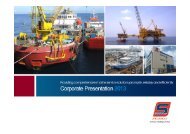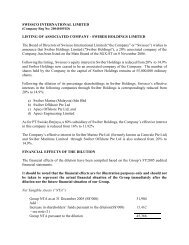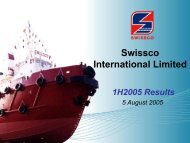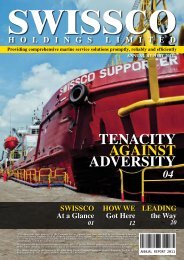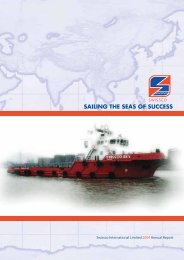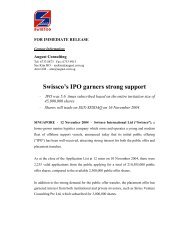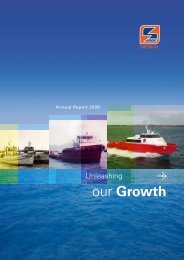Notes to the Financial Statements - Swissco Holdings Limited
Notes to the Financial Statements - Swissco Holdings Limited
Notes to the Financial Statements - Swissco Holdings Limited
Create successful ePaper yourself
Turn your PDF publications into a flip-book with our unique Google optimized e-Paper software.
<strong>Notes</strong><br />
<strong>to</strong> <strong>the</strong> <strong>Financial</strong> <strong>Statements</strong><br />
For <strong>the</strong> financial year ended 31 December 2009<br />
2. Significant accounting policies (continued)<br />
2.1 Basis of preparation (continued)<br />
Interpretations and amendments <strong>to</strong> published standards effective in 2009 (continued)<br />
• Amendment <strong>to</strong> FRS 107 “Improving disclosures about financial statements“ (effective from 1 January<br />
2009). The amendment required enhances disclosures about fair value measurement and liquidity<br />
risk. In particular, <strong>the</strong> amendment requires disclosure of fair value measurements by level of a fair<br />
value measurement hierarchy. The adoption of <strong>the</strong> amendment results in additional disclosures but<br />
does not have an impact on <strong>the</strong> accounting policies and measurement bases adopted by <strong>the</strong> Group.<br />
• Revised FRS 23 “Borrowing Costs” (effective from 1 January 2009). The revised standard removes<br />
<strong>the</strong> option <strong>to</strong> recognise immediately as an expense borrowing costs that are attributable <strong>to</strong><br />
qualifying assets, except for those borrowing costs on qualifying assets that are measured at fair<br />
value or inven<strong>to</strong>ries that are manufactured or produced in large quantities on a repetitive basis. The<br />
amendment does not have a material impact on <strong>the</strong> Group’s financial statements.<br />
2.2 Revenue recognition<br />
Sales comprise <strong>the</strong> fair value of <strong>the</strong> consideration received or receivable for <strong>the</strong> rendering of services in <strong>the</strong><br />
ordinary course of <strong>the</strong> Group’s activities. Sales are presented net of goods and services tax, rebates and<br />
discounts, and after eliminating sales within <strong>the</strong> Group.<br />
The Group recognises revenue when <strong>the</strong> amount of revenue and related cost can be reliably measured,<br />
it is probable that <strong>the</strong> collectibility of <strong>the</strong> related receivables is reasonably assured and when <strong>the</strong> specific<br />
criteria for each of <strong>the</strong> Group’s activities are met as follows:<br />
(a)<br />
Chartering income, sale of out-port-limit services and related income<br />
Chartering income is recognised in profit or loss on a straight-line basis over <strong>the</strong> charter hire period.<br />
Sale of out-port-limit services and related income is recognised when <strong>the</strong> services are rendered.<br />
(b)<br />
Ship repair and related services<br />
Revenue from rendering of services for short-term ship repair projects is recognised upon completion<br />
of <strong>the</strong> job as certified by <strong>the</strong> service engineers. Provision is made in full where applicable for<br />
anticipated losses on project in progress.<br />
(c)<br />
Interest income<br />
Interest income is recognised using <strong>the</strong> effective interest method.<br />
(d)<br />
Dividend income<br />
2.3 Group accounting<br />
Dividend income is recognised when <strong>the</strong> right <strong>to</strong> receive payment is established.<br />
(a)<br />
Subsidiaries<br />
Subsidiaries are entities (including special purpose entities) over which <strong>the</strong> Group has power <strong>to</strong><br />
govern <strong>the</strong> financial and operating policies, generally accompanied by a shareholding giving rise <strong>to</strong><br />
a majority of <strong>the</strong> voting rights. The existence and effect of potential voting rights that are currently<br />
exercisable or convertible are considered when assessing whe<strong>the</strong>r <strong>the</strong> Group controls ano<strong>the</strong>r entity.<br />
<strong>Swissco</strong> International <strong>Limited</strong> Annual Report 2009<br />
42



